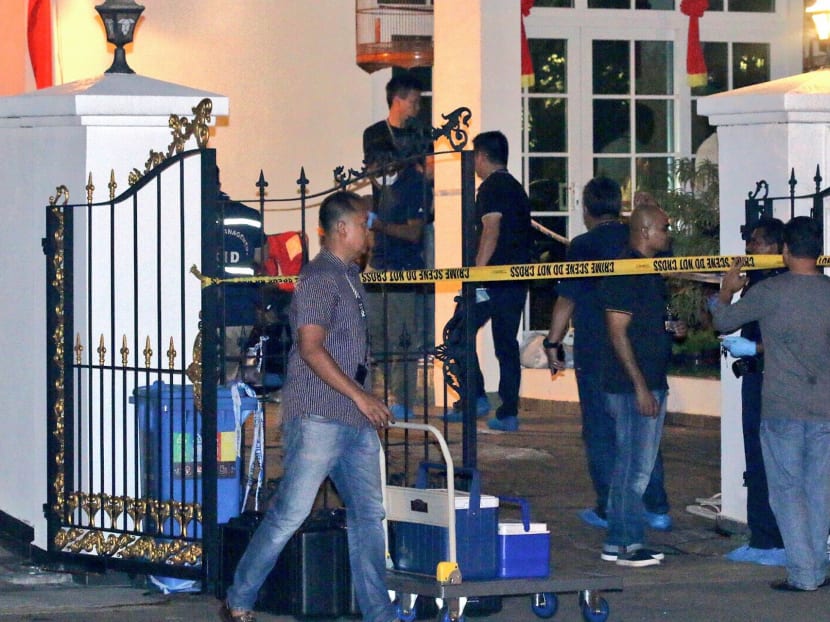Apex court rejects mental illness defence by maid who killed employer by stabbing her almost 100 times
SINGAPORE — Three judges in the Court of Appeal on Thursday (March 31) dismissed an appeal lodged by former foreign domestic worker Daryati against her murder conviction.

The scene at a house on Lorong H Telok Kurau in Joo Chiat in June 2016, after investigators responded to a case where Seow Kim Choo was stabbed 94 times by her domestic worker there.
- Daryati, now aged 29, lodged an appeal against her murder conviction
- The Indonesian maid stabbed her employer to death in June 2016 as part of a plan to return to Indonesia
- She was sentenced to life imprisonment last year
- The Court of Appeal rejected her appeal, agreeing that she did not have persistent depressive disorder
SINGAPORE — Three judges in the Court of Appeal on Thursday (March 31) dismissed an appeal lodged by former foreign domestic worker Daryati against her murder conviction.
The 29-year-old Indonesian, who goes by one name, was sentenced to life imprisonment about a year ago for stabbing her employer to death in 2016. Neither the defence nor prosecution appealed against the sentence.
Following a High Court trial, Daryati was convicted of a capital murder charge that carries either a life or death sentence. The prosecution did not seek the death penalty.
She then unsuccessfully tried to have her charge reduced further to culpable homicide by arguing that she suffered from persistent depressive disorder, which substantially affected her responsibility for the killing.
On Thursday, her new pro bono lawyers pursued the same defence, arguing that the rage Daryati displayed — by stabbing her employer, Seow Kim Choo, a total of 94 times — demonstrated an abnormality of mind.
This, they argued, would give rise to a defence of diminished responsibility, where an accused person is able to show they are suffering from a specific abnormality of mind that substantially impaired their responsibility for causing the death.
Daryati had earlier admitted to intentionally stabbing Seow, then 59, at the deceased's semi-detached house on Lorong H Telok Kurau in Joo Chiat on June 7, 2016.
She also attacked Seow’s husband, businessman Ong Thiam Soon, with a knife and stabbed him in the neck.
Daryati had plotted with the family’s other domestic worker to rob their employer, retrieve her passport and flee back to Indonesia. She also wrote in her diary about carrying out the plan quickly and added: “My employer's family is my target. DEATH!!!”
In convicting the maid of murder, High Court judge Valerie Thean accepted the opinion of the prosecution’s psychiatrist that she did not have symptoms of persistent depressive disorder.
In choosing not to sentence her to death, High Court judge Valerie Thean pointed to factors such as her youth and her court testimony that she had been raped and sexually assaulted by her older brother in her teenage years.
It was not a “cold and calculated killing, but rather, intense panic and distress in executing her plan to return home”, Justice Thean added.

On Thursday, defence counsel Leon Koh, who represented Daryati along with Ms Elsie Lim, asked the court if it was normal for a person to stab someone almost 100 times within eight minutes.
However, the three judges Andrew Phang, Steven Chong and Chao Hick Tin repeatedly observed that the fact someone behaved irrationally or abnormally did not mean that he or she had an abnormality of mind as defined under the law.
Justice Chong told Mr Koh that he could not ignore Daryati’s behaviour, such as being able to come up with an elaborate robbery plot, leading up to the killing.
“Her reaction was because her plan went awry… Everything she planned for was falling to pieces. There was rage, she wanted to immediately silence the victim. True, maybe 10 stabs were enough but she inflicted 94 stabs.
“You cannot ignore that important context. That’s why I kept telling you, you cannot look at this incident in isolation.”
Justice Phang noted that he had “seen perfectly rational people scream and shout and act totally out of character”, but that did not necessarily stem from an abnormality of mind.
The prosecution, led by Deputy Public Prosecutor Wong Kok Weng, responded that High Court judge Thean had already taken into account the relevance of the number of stab wounds.
She had requested a second medical report from Dr Jaydip Sarkar, the prosecution’s psychiatrist, who had read Daryati's diary entries and found that her mood improved significantly when she arrived in Singapore. She had begun planning and strategising by May 2016.
Her actions stemmed from her rage and not an underlying condition, Dr Sarkar found.
In delivering the apex court’s judgement, Justice Phang found no merit in Daryati's defence and agreed with the High Court judge that the worker had not satisfied the three elements of the defence of diminished responsibility.
Dr Tommy Tan, the defence’s psychiatrist who diagnosed her with persistent depressive disorder, had relied largely on Daryati’s self-reported account, which was negated by her own court testimony and the objective evidence, Justice Phang noted.
Her account to Dr Tan also failed to provide a full picture of her mental state when she moved to Singapore, the court said.
Although her diary showed that she was filled with homesickness and longing for her lover, this was not out of the realm of what most foreign domestic workers ordinarily experience in similar circumstances, Justice Phang added.











